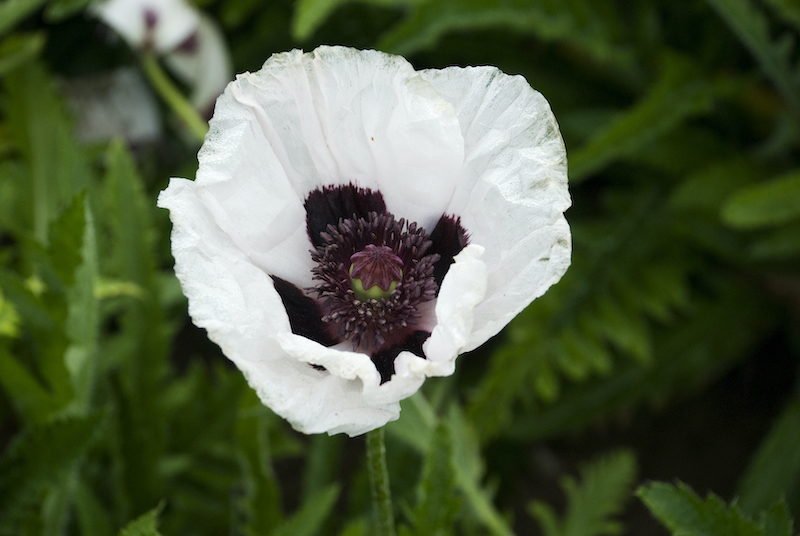Of the over 775 species of Papaver, most of them have some sort of medicinal or edible qualities. The parts and name of the plant are important to know before attempting to use Poppies for medicine or cooking. Every variety of Poppy exudes a latex-like white milky sap from the leaves, stems, and roots. This is a poisonous alkaloid that is sometimes turned into medicines and used to be extracted for home remedies.
Children and small animals have the fastest reaction to the toxic chemicals in Poppies. Even small amounts ingested should be investigated by a doctor or veterinarian. California Poppies, on the other hand, rarely cause reactions unless large amounts of the plant are ingested. Always know the full scientific name of any plant in your garden for accurate identification of side effects.

Are Poppies Poisonous to Children?
Children, especially toddlers and babies, will put just about anything into their mouths. Ingesting even small amounts or Oriental Poppy or Breadseed Poppy can cause a reaction in children. Touching plants briefly will usually not cause contact dermatitis, although Poppies that have very hairy stems and leaves could cause some skin irritation. Do not allow children to play with the seed pods of Poppies. All varieties form pods that act like salt shakers and disperse seed through shaking. The pods are fun to shake, but there is too much risk of the seeds being ingested.

Are Poppies Poisonous to Dogs?
The perennial varieties, Oriental or Breadseed Poppies, are more toxic than annual types like California Poppy. All parts of the Poppy have alkaloids that act as sedatives. Large amounts ingested could be toxic for dogs and even fatal for smaller breeds and puppies.
Symptoms of Poppy poisoning include:
- Sedation
- Hyperactivity
- Small, pinpoint pupils
- No appetite
- Staring off into space

Are Poppies Poisonous to Cats?
The perennial varieties of Poppies are far more toxic to cats than the annual type such as California Poppies. Small amounts of any plant past can cause a reaction. The symptoms of Poppy poisoning symptoms include the following:
- Sedation
- Hyperactivity
- Dilation of pupils
- No appetite
- Staring off into space
Are Poppies Poisonous to Other Animals?
Cattle are the most affected by Poppies. Field Poppies and Breadseed Poppies may be the most common plants to sprout up in grazing pastures and be ingested by livestock. Other ruminants such as sheep and goats do not usually have reactions when ingesting Poppies. The symptoms of Poppy poisoning include:
- Sedation
- Hyperactivity
- No appetite
If you suspect that your livestock have ingested Poppies, contact your veterinarian immediately, so that a course of treatment can be followed either at home or in the clinic.

Symptoms Of Poppy Poisoning
Always check with your doctor or veterinarian for guidance if you suspect poppy poisoning.
Here are some common symptoms to look out for:
- Slow respiratory rate
- Slow heartbeat
- Low blood pressure
- Hypothermia
- Muscle twitching
- Coma
- Seizures
- Brain swelling
- Congestion in the heart and lungs
- Constipation
- Limited or difficulty urinating
- Death
Preventing Poppy Poisoning
Preventing Poppy poisoning can be done in a variety of ways. Try planting the Poppies in an area where pets or children do not play. Alternatively, you can fence off a garden or part of the yard to keep children and pets out. If those are not options, you can select a safer plant to grow until there are no longer pets or small children in your household. Make sure that cats are not left to roam outside with access to your poppies. Dogs that tend to chew on outdoor plants may have a protein deficiency. Using supplements or switching to feed higher in protein may stop this behavior. Always ask your veterinarian before adding supplements to your pet’s food.
Pet Poison Helpline
If something were to happen to your furry friend, and you suspect that they are suffering from Poppy poisoning, there is a poison control hotline to call for 24/7 vet advice. It is called the Pet Poison Hotline, and their phone number is (855) 764-7661.
Sources:
"Dangers of poppies." Department of Natural Resources and Environment Tasmania. nre.tas.gov.au
"Papaver orientale." North Carolina Extension Gardener Plant Toolbox. plants.ces.ncsu.edu
 |
Author Robbin Small - Published 7-26-2022 |
